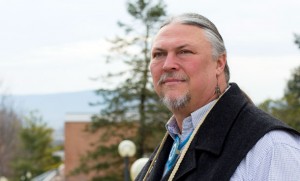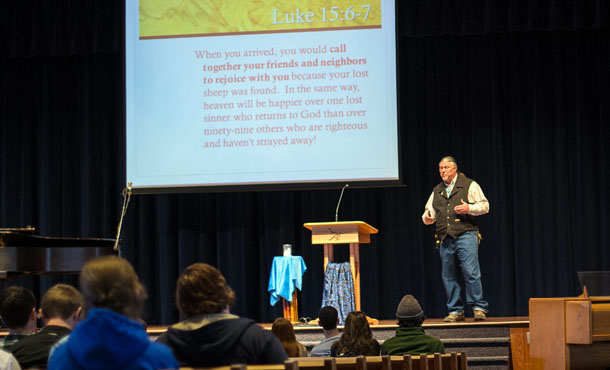The “harmony way” of Native Americans is a lot like the “shalom community” taught by Jesus, according to a seminary professor from Oregon who spoke at Eastern Mennonite University on March 12-13, 2014. Randy Woodley, PhD, is a Cherokee Indian who has spent a lifetime studying the ways of his people as well as the teachings of Jesus.
“It may at first sound strange to you,” he told students, faculty and others at an academic forum in the Common Grounds Coffeehouse, “but the more I learned about Jesus the more he seemed like an Indian spiritual leader or a medicine man to me.”

Woodley, professor of faith and culture at George Fox Seminary in Portland, Ore., spoke at EMU’s annual Augsburger Lecture Series on Christian evangelism and mission.
In 28 years of Christian ministry among Native Americans, Woodley has seen their core values of harmony and balance in similar light to the Christian concept of shalom. He chose this as the subject of his doctoral dissertation from Asbury Seminary. “Shalom is woven into the very fabric of being indigenous,” he said.
“Shalom is a lot more than peace,” Woodley said at the university chapel service in Lehman Auditorium, where he also spoke during his visit. “It’s the way God designed the world to be – one community, embracing all creation.” The more he studied the concept of shalom in the Bible and in church history, however, the more he came to believe that Christians have fallen short in practicing true shalom.
Early missionaries devastated indigenous cultures
The first Christian missionaries to Native American communities, for example, held Western colonialist attitudes about conquering non-Christian lands and “civilizing the savages.” They had little awareness that their ideas and actions were devastating to indigenous cultures, Woodley said. Nor did they consider that God might already have been working among indigenous people.
“Theologically and missiologically, we should always begin by asking in what ways God is already active in the culture,” he said. “Native American values include an already-present relationship with the Creator. And Christians, at least first-century Christians, believed Christ is already present in the culture via his work as Creator.”
Woodley said shalom is antithetical to most American values. “Shalom is cooperation above competition and community above the individual,” he said.
“I am urging Americans to live out Christ’s values through biblical shalom and specifically through understanding the Native American harmony way,” he wrote in a scholarly paper, which he read at the academic forum.
From angry young man to missional work for shalom
Woodley began his address at the university chapel by speaking about his background and his ancestral roots in the Shenandoah Valley near the EMU campus – both from a Cherokee tribe and a white settler community. In the 1970s, he said, he was an angry young man with a meth addiction. After he converted to Christianity and became a “flaming evangelist,” his Christian colleagues told him to ignore his Native American heritage and focus on saving “lost souls.”
As Woodley read the Bible, however, he was drawn to a broader vision, especially as he studied the Christian community that is described in the book of Acts. The early Christians followed Jesus’ teachings about shalom, which called for a different way of loving and living, and urged compassion for the poor and marginalized.
“If the church is not busy making shalom,” he said, “then it has no mission.”
Sitting in the audience at chapel were Myron and Esther Augsburger, who funded the lectureship that brought Woodley to campus. Prior to serving as president of EMU from 1965 to 1980, Myron Augsburger was a well-known author, evangelical leader and evangelist. After he left EMU, he and his artist wife, Esther, founded a church on Capitol Hill in Washington, D.C. Before retiring to Harrisonburg, he also served as president of the Coalition of Christian Colleges & Universities.
35 years of grassroots ministry
Woodley’s theme for his Augsburger lectureship was “Embracing Missional Shalom Community.” During his visit to campus, he also spoke at the seminary chapel service and met informally with students and faculty.
For more than 35 years he has been engaged in what he calls “grassroots ministry.” He founded or helped to form Christians for Justice, Eagle’s Wings Ministry, American Indian Environment & Health Association, North American Institute of Indigenous Theological Studies, Evangelicals 4 Justice, Eloheh Village for Indigenous Leadership & Ministry Development, and Eloheh Farm.
Ordained in the American Baptist Churches, Woodley served as pastor of Eagle Valley Church in Carson City, Nev., which was for many years a unique role model as an authentic Native American congregation.
Woodley has authored Shalom and the Community of Creation: An Indigenous Vision (2012) and Living in Color: Embracing God’s Passion for Ethnic Diversity (2004).
In addition to teaching at George Fox Seminary, he directs its intercultural and indigenous studies program.
